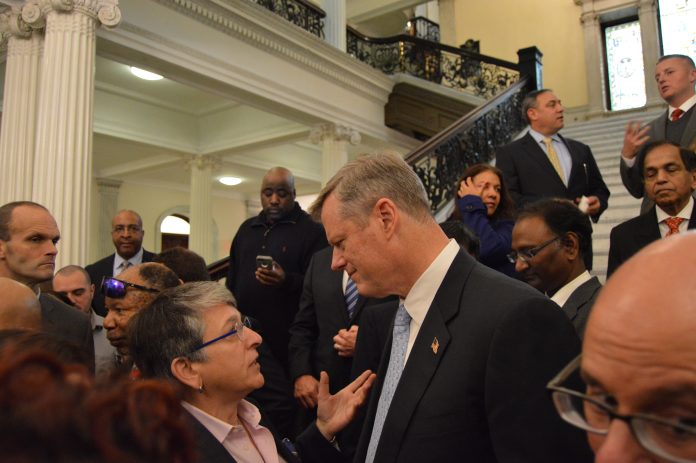
Something interesting happened on the way to marriage equality.
It was businesses who quietly led the way.
It’s all well and good to praise Obergefell and Goodridge and Mary Bonauto and all those civil rights heros.
But it’s worth considering that it was corporations who first took the public risk of recognizing gay people. In the 1970s, mainstream music companies — capitalizing on the craving for disco — became the first major industry to advertise directly to gay people. Absolut vodka followed in 1981, placing ads in gay publications in a high-risk publicity stunt.
Businesses were also the first to officially recognize the love between same-sex partners. In 1982, the Village Voice became the first private company to offer employee domestic partner benefits. And in 1992, Lotus became first publicly traded company to do so.
Of course, businesses weren’t being altruistic. They sought to attract great employees and to help the bottom line. Consider that Absolut’s ad campaign skyrocketed the brand from the fifth best-selling premier vodka in the U.S. to number one.
This was great for corporations and it helped propel the LGBT rights movement. But it didn’t do as much for the LGBT business person.
There’s still a huge LGBT glass ceiling in America. Exactly .5% of Fortune 500 CEOs are openly gay. One, to be exact: Apple’s Tim Cook.
Government supplier diversity programs have largely remained the domain of woman and ethnic minorities. Out LGBT business owners are underrepresented in startup communities and elsewhere.
But that is changing.
In the January/February issue of Boston Spirit magazine I wrote about how Massachusetts became the first state in the country to include LGBT-owned businesses in its supplier diversity policies. last fall
The Commonwealth joined forces with the National Gay and Lesbian Chamber of Commerce (NGLCC) in seeking to officially certify and recognize businesses.
And it was enacted under Governor Charlie Baker, a Republican, so you can be sure it wasn’t about special rights. It’s about equal access to the business table without fear of discrimination.
One successful lesbian business owner, I interviewed for the article articulated it well:
“As a business owner and entrepreneur you have to be confident. You have to be a risk taker,” Stacy Robison of CommunicateHealth in Northampton, told me. “And those things can be hard when you’re faced with discrimination or just worried about how you’ll be received. For the state to do something like this—really rolling out the welcome mat—is really huge.” she said.
In addition, there’s also a rise in other efforts to create an equal seat at the table for LGBT business people.
Last night I had dinner with the Andres Wydler, the new Executive Director of StartOUT, a non-profit with 15,000 members across the country that supports LGBT entrepreneurs. The organization has strong chapters in New York, San Francisco and Chicago. Wydler is visiting Boston to bolster its presence here as well.
This is encouraging. My office is at the Cambridge Innovation Center in Kendall Square and, despite the perception of startup culture being progressive, LGBT visibility is very low.
Other organizations are also stepping up along with StartOUT and the National Gay and Lesbian Chamber of Commerce, including, Pride in our Workplace and the Greater Boston Business Council here in Boston, Out Leadership for LGBTs in the financial Industry, Lesbians Who Tech, and more
The fact is that more ability there is for talented people of any background to work unhindered by prejudice — whether women, men, black, white, transgender, gay or Syrian refugee — the better off we all are.
This is huge.
This is a new era for LGBTs in business.
This is a new era for all of us.








